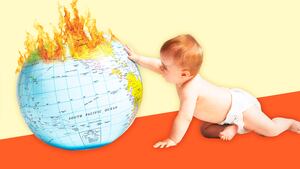Unlike Reese Witherspoon, the Earth is not aging backwards.
As the #10yearchallenge sweeps social media—reminding us that side bangs are a part of our shared history—it seems more worthy to take stock of our planet’s transformation.
Over the past 10 years, our planet has gone through some rough times. Ten years ago, climate change was an emerging concept that was being debated. Over the course of one decade, though, our understanding—and the severity—of climate change has ramped up.
2019 data has not been collected yet, but 2018 data thus far indicates that climate change is speeding up faster than ever. In 2008, then-Sen. Barack Obama was coming into the White House, and two years before that, the climate change documentary An Inconvenient Truth premiered, introducing many people to the concept of global warming for the very first time.
“Ten years ago a lot of climate deniers were pointing to the apparent plateau of warming, [saying] there was no warming,” John Reilly, a co-director of MIT’s Joint Program on the Science and Policy of Global Change, told The Daily Beast.
According to the Intergovernmental Panel on Climate Change’s 2018 Special Report, global warming is “likely to reach 1.5 (degrees Celsius) between 2030 and 2052 if it continues to increase at the current rate.” That may not sound like a significant number, but it could mean the difference between a world with coral reefs and a world without them.
Oceans are an important insulator against climate change, absorbing ultraviolet radiation that seeps through ozone layer holes. That means they usually help cushion against increasing temperatures.
But worrisome new studies suggest that the oceans are at the brink of their limit, heating up faster than expected just five years ago. An upcoming report that will be published in the journal Science in March warns that ocean temperatures increased 40 percent faster than predicted by the United Nations in 2014. In fact, 2018 was the hottest year ever recorded for the planet’s oceans—and it likely won’t be the last.
“The last ten years have seen a dramatic change in our understanding of how fast ocean life is being affected by warming temperatures,” said Malin Pinsky, an Associate Professor of Ecology, Evolution, and Natural Resources at Rutgers University, in an email. “We have a massive movement of life headed towards the poles that is happening right now, and yet we barely realized it a decade ago.”
There have also been advancements in technology to try to understand the effects of rising global temperatures. Reilly said that 10 years ago, scientists didn’t entirely understand why Arctic sea ice was thinning and breaking off at such an alarming rate.
Scientists assumed previously that a warmer atmosphere was the central factor in Arctic ice melt. A 2017 study in the journal Science, however, determined that warm, salty water originating from the Atlantic ocean below the ice is also a major culprit because this water is increasingly pushing its way to the surface and melting floating sea ice. This process, called “Atlantification,” has created more months of open water, threatening Arctic sea ice—the linchpin of Earth’s climate system.
So have we gotten any wiser about climate change and the oceans in the past decade? Not really. Not a single question on climate change was asked during any of the 2016 election debates—presidential or vice-presidential. Which makes sense, since a Pew Research Center poll ranking top voting issues in the 2016 election put environment third from the bottom. While climate change has become more important in policy talks, it’s still lower in value compared to terrorism and the economy. A Gallup Poll found that from 2008 to 2018, the percentage of people who think the seriousness of global warming is “generally exaggerated” barely budged.
Over the past ten years, ice sheets and glaciers continue to melt, with certain regions like the eastern seaboard of the United States and the Gulf of Mexico bearing the brunt of extreme storms and encroaching shorelines. That means increasingly violent hurricanes, horrific wildfires, severe flash floods, and devastating spells of drought.
Hurricane activity in the Atlantic has substantially increased since the early 1980s, when high-quality satellite data became available. The increases in activity are in part a result of higher ocean surface temperatures, which is made worse by greenhouse gas emissions that trap the heat.
According to Michael Mann, director of the Penn State Earth System Science Center, and one of the world’s leading climate scientists, extreme storms and wildfires wreaking havoc around the globe are “the face of climate change.” In a recent op-ed in The Washington Post, Mann argued that the recent revelation that ocean water is heating up at a faster rate than previously expected is an example of what could happen with extreme weather projections.
“We already know that projections historically have been too optimistic about the rates of ice sheet collapse and sea-level rise,” Mann wrote in the Post. “Now it appears they are also underestimating the odds of extreme weather as well. The consequences of doing nothing grow by the day.”








